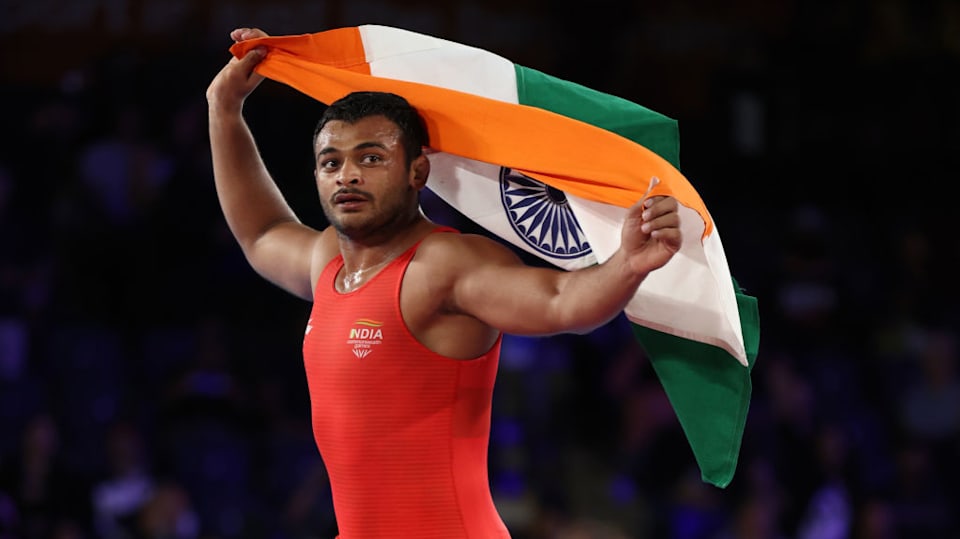Deepak Punia: Wrestling with passion for India
Having begun wrestling in the muddy akhadas, Deepak Punia has risen to become a world junior champion and a Commonwealth Games gold-medallist.

On August 5, 2021, Deepak Punia narrowly missed out on a bronze medal in his debut Olympic Games at Tokyo 2020, losing 4-2 to Myles Amine of San Marino in the medal bout of the 86kg category.
It was an emotional defeat for the Indian wrestler, who had lost his mother a few months earlier. Deepak Punia was hoping to dedicate an Olympic medal to her.
Exactly a year later - on August 5, 2022 - life came full circle for Deepak Punia, who comfortably beat Pakistan’s Muhammad Inam to win the gold medal on debut at the Commonwealth Games 2022.
The medal added to an already impressive collection for the grappler, who began wrestling when he was just five years old.
Wrestling in Deepak Punia’s blood
Deepak Punia was born on May 19, 1999, in the Chhara town of Jhajjar district of Haryana, a place known for its famous local wrestling scene in the traditional muddy pits, called akhadas.
For Deepak Punia, the sport was much closer to home as his father Subash - now a dairy farmer - used to be a local wrestler.
When he was five, Deepak Punia was enrolled in an akhada in his village, run by former wrestler Virender Singh. The young Deepak was given the nickname ketli (kettle) because he once apparently gulped down several glasses of milk until the pot was empty.
Deepak Punia stood out because of his dedication and commitment. His talent meant that he travelled around Haryana, wrestling in local bouts (called dangals) and winning cash prizes.
From akhadas to mats
During a school-level national meet, Deepak Punia was spotted by a coach at the Chhatrasal Stadium in New Delhi, the place famous for producing some of India’s finest wrestlers like Sushil Kumar, Yogeshwar Dutt and Bajrang Punia.
The teenager relocated to New Delhi but faced a major issue - he had not wrestled much on a synthetic mat, used in competitions around the world. Having wrestled in mud his whole life, Deepak Punia had to radically change his approach.
However, Deepak Punia soon adapted and even started winning. He won the gold medal at the 2016 junior Asian wrestling championship in Manila, the Philippines and followed it up with another gold at the world cadet championships in Tbilisi, Georgia.
Deepak Punia won gold again in the 2018 Asian juniors and this time, also made a mark on the global stage, winning silver at the 2018 world junior championships in Trnava, Slovakia.
In 2019, Deepak Punia would rewrite history as he became the first Indian since Palwinder Singh Cheema in 2001 to become the junior world champion. He won the 86kg title despite injuring his thumb ahead of the event.
Smooth transition
A month after winning the world junior championship, Deepak Punia was in focus again at the senior world championships in Nur Sultan, Kazakhstan.
The grappler made his way to the final of the 86kg category, where he would have had the chance to become only the second Indian wrestling world champion after his mentor Sushil Kumar.
However, a shoulder injury - sustained during the junior worlds - and a leg injury became unbearable. He was unable to wrestle with Olympic and world champion Hassan Yazdani of Iran in the final and had to return home with the silver medal.
The run to the final earned him a quota for the Tokyo Olympics, where he just fell short of a bronze.
Deepak Punia soon put the disappointment behind him, winning two silvers at the Asian championships - in 2021 and 2022 - before striking gold at the Commonwealth Games in Birmingham.
In the gold medal match, Punia was up against Pakistan’s Muhammad Inam, a two-time Commonwealth Games champion from 2010 and 2018. The Indian won the match 3-0.
"It is a very proud moment for me," Deepak Punia said. "There is no greater feeling than standing on a podium with a gold medal around your neck, the Indian national anthem playing, and having a crowd like this cheering you on."
